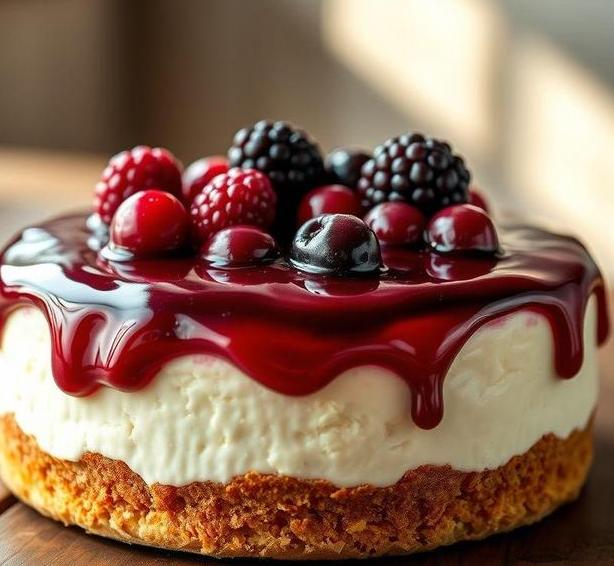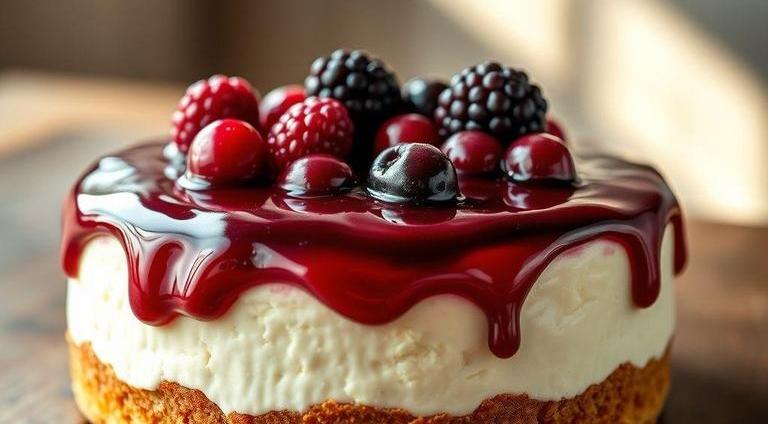Cheesecake-rich, velvety, and irresistibly indulgent-has secured its place as a beloved dessert in kitchens, bakeries, and cafes worldwide. Whether you prefer a classic New York-style cheesecake or enjoy experimenting with fruity or chocolatey variations, one thing’s for sure: a good cheesecake is a true treat. But like all delicious foods, cheesecake has its shelf life, and knowing how to store it properly and identify when it’s no longer safe to eat is crucial to enjoying it at its best.
So, what happens when you can’t finish a cheesecake in one sitting (or two, let’s be real)? Can cheesecake go bad? How do you keep it fresh for as long as possible? These questions are common for anyone who loves the creamy, dreamy dessert. Don’t worry, though! In this detailed guide, we’ll dive into everything you need to know about cheesecake spoilage-from shelf life to storage tips, and signs to look out for when the cheesecake has taken a turn for the worse. Let’s get into it!
Can Cheesecake Go Bad?
Yes, cheesecake can go bad, but it’s not as straightforward as you might think. Like other dairy-based products, cheesecake is highly perishable, thanks to its combination of cream cheese, eggs, and sometimes sour cream, all of which are prone to spoilage over time. The real issue comes with how it’s stored, how long it’s been sitting out, and whether any bacteria has had a chance to grow on the surface.
Here’s the deal: cheesecake doesn’t spoil as quickly as other perishable foods like raw meat or seafood, but it’s definitely not something that can sit on your countertop indefinitely. As time passes, its texture, flavor, and even safety can change, which is why knowing how to spot bad cheesecake is so important.
Shelf Life For Cheesecake

The shelf life of cheesecake varies based on whether it’s homemade, store-bought, or frozen. Here’s a quick breakdown of the expected timeframes:
-
Homemade Cheesecake
- Refrigerated: 3-5 days. Homemade cheesecake doesn’t have preservatives, so it has a relatively short shelf life.
- Frozen: Up to 1-2 months. Freezing your cheesecake will preserve it much longer, but even frozen cheesecake loses some of its texture and flavor over time.
-
Store-Bought Cheesecake
- Refrigerated: 5-7 days. Store-bought cheesecakes generally contain preservatives, which means they last a bit longer than homemade versions.
- Frozen: 1-2 months. If you bought a cheesecake and want to save it for later, freezing is your best option.
-
Cheesecake Slices Or Individual Servings
- Refrigerated: 2-3 days. When a cheesecake is cut into slices, the exposed edges are more vulnerable to bacteria and spoilage, shortening its shelf life.
- Frozen: 1-2 months. Same rule applies: freezing slices keeps them from spoiling but doesn’t maintain their original flavor as well as when it’s whole.
Common Signs Of Spoilage
Cheesecake can be tricky because it doesn’t spoil the same way some other desserts do. It’s not like a cake where the frosting starts to peel off or the texture changes dramatically in a day or two. Instead, spoilage is more subtle, so you’ll need to rely on a few telltale signs to know if it’s time to toss your slice (or the whole thing).
Here are the key indicators that your cheesecake has gone bad:
-
Smell
- The first thing to check is the scent. A fresh cheesecake has a mild, slightly sweet smell with a hint of dairy. If it starts to smell sour, like spoiled milk or old yogurt, it’s a sign that it’s no longer safe to eat.
-
Texture
- Cheesecake should be smooth and creamy with a firm yet soft consistency. If it has developed an overly dry or mushy texture, it’s past its prime. In some cases, moisture might even collect on the surface, which is a sign of bacterial growth or improper storage.
-
Color Changes
- Look for any discoloration, especially near the edges or top. If you see any browning, grayish, or even greenish hues, it’s an indication of mold or spoilage. Cheesecake typically doesn’t ’ripen’ like some other desserts, so any change in color is a red flag.
-
Taste
- If you’ve checked the smell and texture but are still unsure, a small taste test can reveal whether the cheesecake has gone bad. Spoiled cheesecake will taste sour, off, or even bitter-definitely not the rich, creamy sweetness you expect.
How To Store Cheesecake?

Proper storage is key to extending the life of your cheesecake and keeping it fresh for as long as possible. Follow these tips to avoid unnecessary spoilage:
-
Refrigeration
- Always store cheesecake in the refrigerator to prevent bacterial growth. After serving, cover the cheesecake with plastic wrap, aluminum foil, or place it in an airtight container. This will help maintain its texture and prevent it from absorbing any unwanted odors from other foods in the fridge.
-
Freezing
-
Avoid Leaving It Out
- Never leave cheesecake out at room temperature for more than 2 hours. The cream cheese and eggs in the filling are prime candidates for bacterial growth if they stay warm for too long.
-
Keep It Covered
- Exposure to air can dry out cheesecake quickly. Always cover it well, especially if it’s already been sliced or has been exposed to the air.
Expert Tips
Want your cheesecake to last longer and stay as fresh as possible? Here are a few expert tips to help you keep your dessert at its best:
- Don’t Overmix the Batter: When making homemade cheesecake, avoid overmixing the batter. This can cause air bubbles to form, which might lead to cracks in the cheesecake’s surface as it bakes-and cracks can affect storage and freshness.
- Opt for Fresh Ingredients: Use fresh cream cheese and eggs. The quality of your ingredients will impact the cheesecake’s shelf life and flavor.
- Store Tightly Wrapped: Even in the fridge, wrap your cheesecake tightly in plastic wrap and place it in an airtight container. This prevents it from drying out or absorbing any unwanted flavors from other foods in the refrigerator.
- Use a Cake Carrier for Travel: If you need to transport your cheesecake, use a cake carrier to keep it safe from damage and bacteria during transit. These carriers also help maintain the temperature.
- Avoid Freezing Toppings: If your cheesecake has fresh fruit, whipped cream, or other delicate toppings, it’s best to remove those before freezing. The toppings will suffer in texture, while the cheesecake itself holds up better in the freezer.
FAQs
How Long Can Cheesecake Last In The Fridge?
Cheesecake can typically last for about 4 to 5 days in the fridge if stored properly in an airtight container. After this time, its texture and flavor may start to degrade.
Can You Freeze Cheesecake To Extend Its Shelf Life?
Yes, you can freeze cheesecake. When wrapped tightly in plastic wrap and aluminum foil, it can last up to 2-3 months in the freezer. However, freezing may affect its texture once thawed.
How Can You Tell If Cheesecake Has Gone Bad?
Signs that cheesecake has gone bad include off smells, visible mold growth, changes in color (such as browning), and a sour or unpleasant taste. If it feels slimy or has a significant change in texture, it’s best to discard it.
Can Cheesecake Go Bad If Left Out Overnight?
Yes, cheesecake can go bad if left out at room temperature for more than 2 hours. The dairy and egg content make it susceptible to bacterial growth, leading to spoilage.
How Should Cheesecake Be Stored To Prevent It From Going Bad?
To prevent cheesecake from going bad, it should be stored in an airtight container in the refrigerator. If you plan to keep it for an extended period, freezing it is the best option.
Does The Type Of Cheesecake Affect How Long It Lasts?
Yes, different types of cheesecakes can have varying shelf lives. A no-bake cheesecake may spoil faster than a traditional baked cheesecake, as it doesn’t have the same structural integrity to resist spoilage.
Can Cheesecake Still Be Eaten After The Expiration Date?
Cheesecake should be consumed before the expiration date for the best taste and quality. However, if the cheesecake shows no signs of spoilage (such as off smells or mold), it may still be safe to eat for a day or two after the date.
Can I Eat Cheesecake That Has Freezer Burn?
Freezer burn does not make cheesecake unsafe to eat, but it can affect the texture and flavor, making it less enjoyable. If the cheesecake has a noticeable off taste or texture, it’s best to discard it.
What Happens If I Eat Spoiled Cheesecake?
Eating spoiled cheesecake can lead to food poisoning, which may cause symptoms like nausea, vomiting, stomach cramps, and diarrhea. It is important to discard any cheesecake that appears spoiled to avoid health risks.
How Long Does Homemade Cheesecake Last Compared To Store-bought Cheesecake?
Homemade cheesecake typically lasts 3 to 5 days in the refrigerator, while store-bought cheesecake, which may contain preservatives, can last a bit longer, up to 7 days. However, both types should be stored properly to ensure freshness.